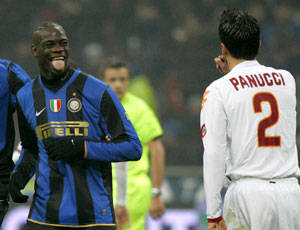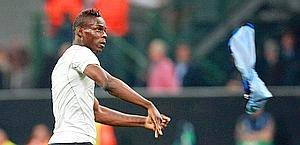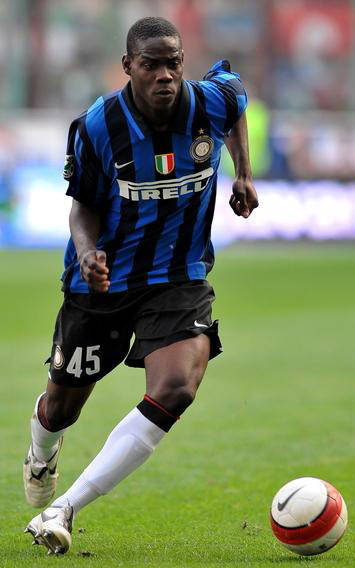Mario Balotelli. An Italian Soccer Player with the Wrong Skin Colour?
Italian soccer players are famous worldwide not only for their talent, but often also for their life stories, which are sometimes scandalous, but are also often good examples for the fans – especially the youngest ones – who look at them as their own heroes. Many of them come from poor families that did not have the means to send them to school or prepare them to a professional career. They started playing soccer just for fun, and found in it the passion of their lives, and their future.
Among all the stories we could recount you, we chose the one of Mario Balotelli, a story that gives us the opportunity not only to talk about soccer but also of another dominant theme in modern Italy: immigration and racism. Mario, in fact, is not only a champion, but is also a black Italian who is struggling against an often fierce discrimination, that keeps him from bringing his career at its apex. He is only one of many sons of Italian immigration that finds in racism the main obstacle to the accomplishment of his dreams.
Mario was born in Palermo on August 12 1990, the son of Thomas and Rose Barwuah, two Ghanaian immigrants, who at first abandoned him in the city’s hospital, maybe because of poverty or, as it is said, because of the health problems Mario had at his birth.
It was a judge of the province of Brescia that changed Mario’s destiny, when he gave him in custody to the Balotelli family. Spending his childhood in the small town of Bagnolo Menella, located in the province of Brescia, Mario finally discovered his passion for soccer at the age of 6. He found the support of his new parents who not only treated him as their own kid, but also encouraged him to play with his mates in different local teams, giving him the opportunity to cultivate his talents.
Mario could never imagine that in the summer of 2006 his life would have reached a turning point, and only thanks to this childhood passion. After having been observed by a number of A series teams such as A.C.Fiorentina and F.C. Barcelona, the F.C.International offered him an important contract that not only allowed him to play soccer, but also to go to school.
Mario knows that he owes most of these accomplishments to his Italian family. He loves them and is thankful for the love and support they gave him, things that every son needs. At the same time he is quite resentful towards his natural parents from which he felt abandoned: they might have been poor as ever, he thinks, but the Balotelli family was too, and kept him anyway. He never felt wanted by the Barwuah family who, only now that he is rich and famous, showed up again claiming that they need their son.
Having lived all his life in Italy, and growing among Italian people, Mario feels 100% Italian himself. Thanks to law n.91 of Feb. 15 1992 Mario finally became an Italian citizen two years ago. Having his custody never been upgraded to adoption, in fact, he could not get it before. He has already played for the under-21Italian team but now that it is time for him to play in the seniors team the color of his skin has become an even greater obstacle to overcome.
However, many do not look at him as their compatriot because of the color of his skin. He has been victim of racism in several occasions, especially at the stadium: not only team supporters addressed him every kind of insult, but also threw him bananas and other objects with the risk of serious injures.
The ones against him are only an example of the various episodes of racism that often take place in Italy’s stadiums. Sometimes referees also suspend the matches because fans go really too far, with hymns and different kinds of nasty behaviors against players of other skin colors.
But his problem is not just the color of his skin because the common opinion is that Mario Balotelli hasn’t been selected to participate in the World Cup because of his rebel temperament. His behavior is defined in such a way because of the numerous disorders of which he was protagonist inside and outside the soccer pitch.
Among them, the one that occurred during the Coppa Italia final, when he offended the Rome team’s players and supporters, or the other that happened at the end of the UEFA Champions League match Inter vs Barcelona, when he launched his jersey to show his anger against his supporters instead of celebrating for the great result of the match; there are many other episodes that bring coaches and supporters to judge him more for his rebel nature than for his qualities as a soccer player.
This is the reason why Mario and others Italian players haven’t been selected for the World Cup. This can also suggest that explaining his absence at this year’s World Cup by defining the coach “racist” can lead to an important misjudgment of the real situation
It’s up to him decide to change his behavior to play for the senior team and thus to be judged exclusively for his talents and not for the color of his skin.
The truth is that Italy is not used to players like Balotelli. While in fact in other European countries you find players of different origins because of the colonial past of these nations, Italy has only recently become a country of immigration. This does not mean, however, that such skin-colored Italian players will be treated any differently.
The summer months are well known as a period of negotiations among the big soccer clubs in Europe that exchange their greatest talents. Mario received lots of offers by some English great teams, a country where the soccer environment is completely different, where the racism issue is somehow weaker. Only time will tell us which will be the best choice, to remain in Italy or to move abroad.
The figure of Mario Balotelli gives the opportunity to reflect about different issues. In particular, why should talented people – not only soccer players – move away from Italy to accomplish their goals and gain success? And, is racism still an important limit for people like Mario Balotelli, who are Italians but come from a foreign background?







































i-Italy
Facebook
Google+
This work may not be reproduced, in whole or in part, without prior written permission.
Questo lavoro non può essere riprodotto, in tutto o in parte, senza permesso scritto.